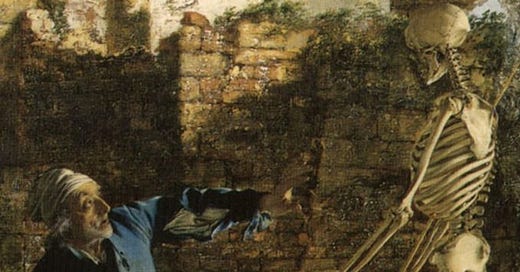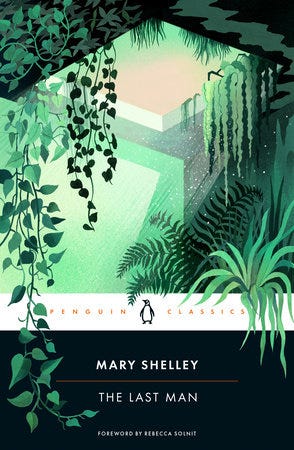Mary Shelley is most well known for "Frankenstein", a classic example of Gothic literature and an incredibly influential work. Her less popular “The Last Man” was first published in 1826 and received with less enthusiasm by her contemporaries, but it has become a lot more relevant in recent years.
Summary: Lionel Verney, the last man on Earth, narrates how humanity came to an end in the late 21st century due to the ravages of a plague that consumed the entire world in less than a decade. The story covers the entirety of Verney’s life, from his rough childhood as an orphan to the convoluted love triangles and political intrigues of his youth, all the way to the lonely and desperate years of the plague. Verney’s story has many parallels to Mary Shelley’s own life, and the story serves to voice her opinions on what she perceived to be the failure of the Romantic ideal.
“Happy are dreamers," he continued, "so that they be not awakened! Would I could dream!”
The characters.
I didn’t particularly care for the titular Last Man. The story can be divided into three sections: the complicated love drama between the main cast, the Greek war, and the plague properly, and Lionel’s role in all three is very underwhelming. He is a very passive character, mostly an observer of what his much more compelling friends and family do.
By far my favorite character was Perdita, Lionel’s overtly sensitive and melancholic sister. Perdita deserved better than Raymond, but despite how messy their relationship gets, I think they are the most interesting pair in the whole book. The flaws that would lead to their doom are introduced from the very beginning, but it’s still tragic to see them meet their fate. They are both very selfish, even if that selfishness manifests in less obvious ways in Perdita’s case.
I think the characters in general are not very interesting on their own, it’s more about the relationships between them. Of the two main couples, Lionel and Idris get the least amount of development because they are just so perfect and happy together that there is no source for conflict. That, in turn, makes his love for Idris really boring and dry. She is more of an ideal than a real person. His relationship with Adrian is more compelling because, despite Adrian being highly idealized in Lionel’s mind, he still fails and changes across the course of the story. Lionel’s love for Adrian felt more deserved, in a way. His final moments with Adrian and his niece Clara are incredibly moving.
I am alone in the world — but that expression as yet was less pregnant with misery, than that Adrian and Clara are dead.
A very optimistic take on the plague, in retrospective.
Obviously, Mary Shelley had no way to know that the plague would come in the 2020s and not the 2090s, but it is interesting how close she was and how different it goes in her story.
In The Last Man, we are told that the rich nobles of England were kind enough to share their land with the poor and the immigrants and that everyone, regardless of class, worked hard for humanity (or so we are told, what we are shown disagrees somewhat). The plague was the equalizer, and everyone took the threat to the human species very seriously, to the point that people were unwilling to wage war on one another because every human life was priceless.
Having lived through “the plague”, I think we can all agree this is wildly unrealistic. It is funny to see that despite the book’s bleakness, Mary Shelley still thought that humanity was able to bond together for a common cause. Instead, we got celebrities singing from their mansions and half the world saying that masks are unnecessary and that Covid wasn’t real. Oh, well. This is no fault of the book, of course, but it does make reading it a very funny experience.
The Last (white, upper-class) Man.
There is a very short scene that stood out to me. In the scene, Lionel is rushing into the house where his family is staying, looking for his wife whom he thinks is on the verge of death. In his desperation, he opens the wrong door and enters a dark room, where a black man, sick with the plague, jumps at him moaning and suffering from great pain. He is described as a terrible wretch. Lionel is horrified, not at the lonely suffering of that man, but at being touched by him. Lionel frees himself from the black man and, feeling dirty and sick, goes to find his wife. This is the only time in the entire book that black people are mentioned.
With mixed horror and impatience I strove to disengage myself, and fell on the sufferer; […] I sprung up, threw the wretch from me, and darting up the staircase, entered the chamber usually inhabited by my family.
This scene reminded me that the main character was white, and that this was written by a white woman in the 1800s, something that I had unconsciously put away from my mind. I realized that, among all the dying white people of England, which we are meant to sympathize and feel bad for, there are also people of color dying of the plague, all around our main cast, completely unmentioned. We are told that Adrian, kindly and noble Adrian, has been visiting hospitals and spending time with the sick, and that Lionel himself is not scared to touch those that have the plague. But Lionel is disgusted by the sick black man. Are there black people in the hospitals Adrian has been visiting?
At the end, when Lionel is all alone in the world, is he truly the last man? or is he just the last human that Mary Shelley would have seen as such — a white man.
Something that also took me out of the story was whenever servants were mentioned towards the end. Mary Shelley tells you that “the plague made everyone equal” but then goes on and says that there are still loyal servants that stay beside their masters to the bitter end. How does that work? Why, on a world ravaged by plague, with no chances of survival, would someone still work as a servant? It makes no sense, but I guess Mary Shelley could imagine an apocalypse but not that people would stop serving “their betters”.
Final thoughts.
Did God create man, merely in the end to become dead earth in the midst of healthful vegetating nature? Was he of no more account to his Maker, than a field of corn blighted in the ear? Were our proud dreams thus to fade? Our name was written “a little lower than the angels” and, behold, we were no better than ephemera.
There are a lot of beautiful moments in the book, particularly towards the end when the plague takes center stage. As humanity dies out, we get to see some side stories concerning survivors the characters meet along the way. The ballet dancer, performing for the final time, gone mad with grief. The lone noble, too scared to approach others but following them from afar, desperate for companionship, dying alone on the road. The blind father, unaware of the plague, dying alongside his faithful daughter. This is why I love apocalyptic stories.
“The Last Man” is a long and somewhat dragged-out book. The plot takes a long time to start, and while some of the characters are very deep and complex, others are just plain and boring, like the main character. Some aspects have definitely not aged well. It’s a sad tale of the powerlessness of humanity, and it can be very moving at times. Overall, it was fine — not great, but not terrible either.
Rating: 3.5/5
… but man, in himself weak, yet more powerful in congregated numbers than wind or ocean; man, the queller of the elements, the lord of created nature, the peer of demi-gods, existed no longer.




